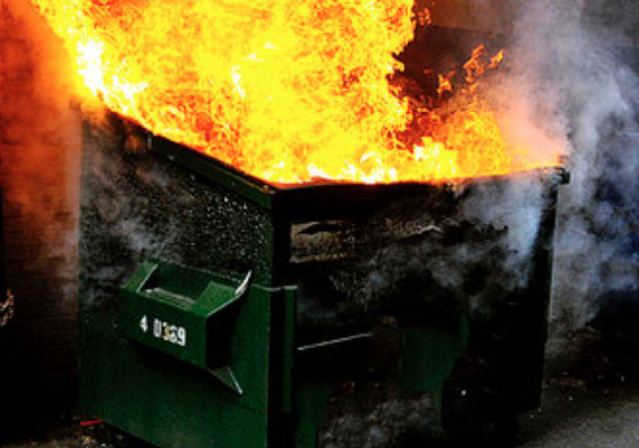Merriam-Webster adds ‘dumpster fire’ to dictionary in latest expansion
Blockchain, welp, and wordie also included

Merriam-Webster announced Monday that 850 words have been added to the American English dictionary.
Language is dynamic and reflective of cultural trends and the latest round of words promoted from colloquial to official prove as much.
‘Dumpster fire’, used to describe a complete disaster, usually of the mismanaged kind, can now be found in the dictionary, among other internet-based words.
After considering its widespread and meaningful evidence of use, we've put 'dumpster fire' in the dictionary. Feel free to GIF it as you like. https://t.co/XImxk6c0EY
— Merriam-Webster (@MerriamWebster) March 5, 2018
Words like ‘cryptocurrency’, ‘blockchain’, ‘subtweet’, and ‘hate-watch’ all reflect changes in the way we handle currency, communication, and entertainment.
‘Dark chocolate’ and ‘case-sensitive’, lead the list of compound word additions. While ‘glamping’, ‘wordie’, and ‘Yorkie-Poo’ illustrate a weird modern tendency to combine two perfectly good words.
From Merriam-Webster:
A big batch of new words and new definitions for existing words has just been added to our dictionary at Merriam-Webster.com: 850 terms that come from a cross-section of our linguistic culture.
There is always something for word lovers when we add entries to the dictionary, but this time there’s actually a new word meaning “word lover” among them: wordie, patterned after other words denoting enthusiasts such as foodie and groupie. A word used to identify other words is a new tool for linguists, and a demonym names a person who comes from a specific place, like Hoosier or Parisian. Words that come from other places are known as Wanderworts-from the German words meaning “wander” and “word.” It refers to a word borrowed from another language, often as a result of trade or the adoption of newly introduced items or cultural practices.
Food and menus created a large chunk of the latest additions:
There is always something for word lovers when we add entries to the dictionary, but this time there’s actually a new word meaning “word lover” among them: wordie, patterned after other words denoting enthusiasts such as foodie and groupie. A word used to identify other words is a new tool for linguists, and a demonym names a person who comes from a specific place, like Hoosier or Parisian. Words that come from other places are known as Wanderworts-from the German words meaning “wander” and “word.” It refers to a word borrowed from another language, often as a result of trade or the adoption of newly introduced items or cultural practices.
Annoyingly, ‘mansplaining’ was codified as an official English word (thanks to neo-feminists who actively practice sexism towards men while simultaneously crying ‘sexism’).
Welp, ‘welp’ made the cut:
Finally, we see the inclusion of an increasing number of interjections and respellings, in part because communication via electronic text increasingly uses approximations of speech, including hmm, ooh, mm-hmm, and, welp, welp. Which just goes to show that the dictionary can still be useful for providing meanings even when you’re speechless.
I like to think I did my part in proliferating ‘dumpster fire’, particularly as a descriptor for Obamacare and the 2016 election.
 DONATE
DONATE
Donations tax deductible
to the full extent allowed by law.








Comments
“personal responsibility” removed from dictionary.
Then they have room for this new word.
“Farrakhan-Linked” – as in DNC Ellison is Farrakhan-Linked.
http://www.breitbart.com/big-government/2018/03/05/farrakhan-linked-group-lead-national-school-walkout-march-14-guns/
Farrakhan-Linked Group to Lead National School Walkout
I guess shithole country is a bit too avant-garde for Merriam-Webster, useful concept though it may be. Well, maybe next time.
They should also add:
S* California
S* Democrat Party
S* City
S* State…….
But The President only used one of those phrases, as the headlines never tire of reminding us. That makes it special and more difficult to brush off, much like the fashion world watching to see what sort of novelty chapeau the Prince of Wales might wear to Ascot.
I’m sure he only used one word also, probably “hole.”
When I read the title, I just KNEW it had to be from Kemberlee. You’re too funny. LOL!
Have they changed the definition of “journalist” yet?